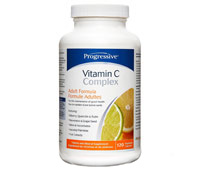|
This unique formulation contains a synergistic combination of isolated and botanical forms of Vitamin C, as well as an array of complementary nutrients designed to enhance Vitamin C uptake, absorption and utilization while maximizing antioxidant activity. The use of multiple Vitamin C sources (especially those derived from whole plant extracts) greatly increases the overall efficacy and harmony of this product, as each component contributes its own unique nutritional properties.
Two pure vegetable capsules contain 1,200mg of the most bio-available, non-acidic Vitamin C obtainable. This comprehensive formula has been designed to be consumed on an ongoing, daily basis and can be taken by every adult member of your family.
Professionally formulated and energetically tested, Progressive Vitamin C Complex contains no gelatin, artificial flavours, colour, animal products or preservatives of any kind. In addition, each bottle is packaged using a two-step airtight process. The clear outer seal offers tamperproof protection, while the inner induction seal provides a secure airtight barrier Ð further guaranteeing product potency and freshness.
Isolated Sources of Vitamin C
Mineral Ascorbates
The majority of the isolated Vitamin C in this formula is derived from a carefully selected combination of mineral ascorbates. Not only does this combination ensure thorough and rapid absorption along with unsurpassed Vitamin C activity, it is also far less acidic than traditional ascorbic acid. This means that even if taken in large doses, these mineral ascorbates will not cause any of the gastrointestinal challenges associated with ascorbic acid. Mineral ascorbates are also a rich source of minerals, which further enhances absorption and offers some additional secondary health benefits. The proprietary blend of ascorbates in Vitamin C Complex includes: Calcium Ascorbate, Magnesium Ascorbate, Manganese Ascorbate, Zinc Ascorbate, and Potassium Ascorbate. This combination far exceeds the activity of any of the mineral ascorbates taken individually.
Ascorbyl Palmitate
In addition to the mineral ascorbates listed above, Progressive Vitamin C Complex also contains Ascorbyl Palmitate. This fat-soluble, antioxidant form of ascorbic acid (Vitamin C) offers some distinct advantages. It is an amphipathic molecule, meaning one end is water-soluble and the other end is fat-soluble. This dual solubility allows it to be easily incorporated into and stored by the membranes of our red blood cells, thus protecting them from oxidative damage. It also works to protect vitamin E (fat soluble) from oxidation by free radicals, so it’s antioxidant activity within the body is accelerated.
Botanical Sources of Vitamin C
Fruit Concentrates
Progressive Vitamin C Complex also provides additional Vitamin C with the inclusion of fruit concentrates. These natural food sources of Vitamin C exist in harmony with the whole foods they are derived from. While isolated sources of Vitamin C offer increased potency, whole food sources offer natural balance and synergy. They also provide us with a whole host of minerals, antioxidants and anti-bacterial fighting agents.
Indian Goose Berry
The pulp of this fruit contains nearly 20 times more Vitamin C than orange juice. Indigenous to India, this fruit has been used medicinally throughout history to treat inflammation, asthma and allergies, in addition to fevers and colds.
Blueberry Extract
While blueberries are a rich source of Vitamin C they are also nature’s most potent source of the anti-aging antioxidant anthocyanin, which is also what gives them their blue colour. Daily consumption of blueberries increases the body’s ORAC (oxygen radical absorbing capacity) ability. They are considered to be the fruit with the greatest anticarcinogenic effect. They have also been used to prevent both urinary tract infections and cardiovascular disease.
Cranberry
Cranberries are a close relative of the blueberry, and thus share many of the same health promoting properties. They are most well known for their traditional use in treating bladder infections, but also act as a blood detoxifier, and are a great source of Vitamin C.
Acerola Berries
Acerola berries contain Vitamin C, calcium, iron, magnesium, malic acid, niacin, pantothenic acid, phosphorous, potassium, riboflavin, and thiamine. They have been used traditionally in Brazil as a natural aid for anemia, diabetes, high cholesterol, liver problems, rheumatism, and tuberculosis. They also have significant antioxidant properties.
Elderberry
Elderberries are another great botanical source of Vitamin C. Elderberries support immune function and inhibit viruses, thus there are widely used to treat and prevent colds and flu’s, and are particularly useful for respiratory infections. Elderberries are also being studied for their potential activity against other viral illnesses including HIV and Herpes.
Camu Berries
Camu berries are from the Amazon, and are considered one of the richest naturally occurring sources of Vitamin C in the world.
Kiwi Extract
The FDA has classified kiwi fruit as excellent source of Vitamin C.
Mango Fruit
Indigenous to India, Mangoes are a potent source of Vitamin C. This delicious fruit has been used to treat gastrointestinal disorders, liver toxicity, blood disorders and bacterial infections.
Kiwi Extract
The FDA has classified kiwi fruit as excellent source of Vitamin C.
Complementary Nutrients
While choosing the right source of Vitamin C is critically important, it is equally important to remember that Vitamin C does not work alone, and that the presence and interaction of other complementary nutrients must also be taken into account.
Quercetin (Bioflavonoid)
Quercetin is a water-soluble, non-citrus bioflavanoid that helps to protect and enhance the effects of Vitamin C. It also acts as a natural antioxidant, protects the body from free radical damage and has both antihistamine and anti-inflammatory properties.
Resveratrol
Resveratrol is an antioxidant found in red wine. It contains all the Vitamin C preserving benefits of quercetin, as well as being a phytoestrogen with similar cardiovascular and anti-carcinogenic activity to soy.
Hesperidin & Rutin (Citrus Bioflavonoids)
Evidence has shown that citrus bioflavonoids may help reduce cholesterol levels, control inflammation.
Grape Seed Extract
Grape seed extract is thought to be one of nature’s most potent antioxidants due to its naturally occurring proanthocyanidins or Procyanidolic oligomers. These proanthocyanidins are special because they neutralize both fat and water soluble oxidants.
Bilberry
Bilberry contributes many of the same benefits as grape seed extract. This herb contains biologically active substances called anthocyanosides that may benefit the retina, as well as strengthen the walls of blood vessels, and reduce inflammation.
Optimum Digestion and Absorption
Progressive Vitamin C Complex also contains nutrients to enhance the digestion and utilization of the formula. These include the plant based digestive enzymes Bromelain and Papain, as well as a Bioperine® a patented piperine extract that improves the passage of nutrients across the intestinal wall and into the blood stream, thus increasing the absorption of the entire formula.
|



 CANADA
CANADA UNITED STATES
UNITED STATES

